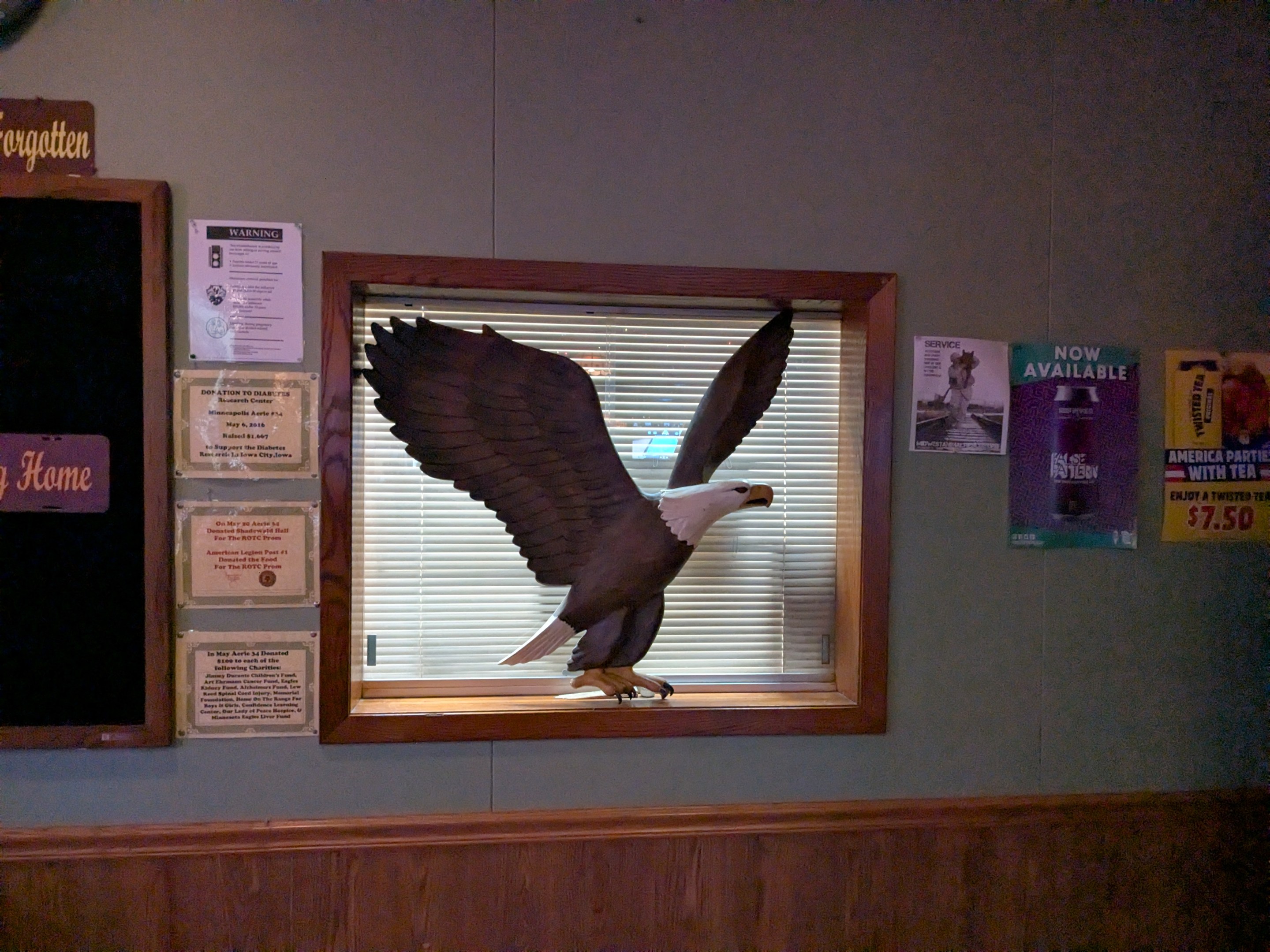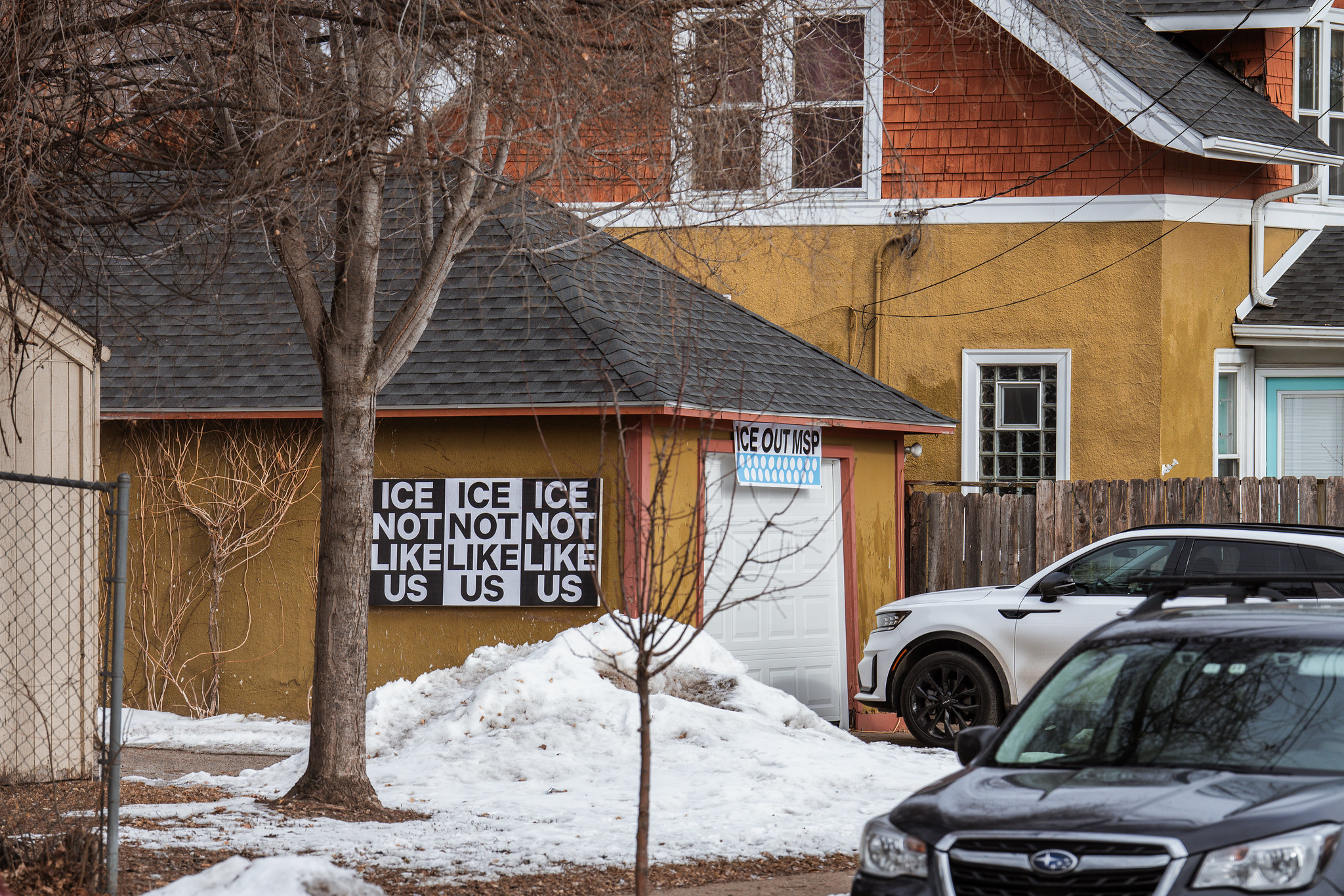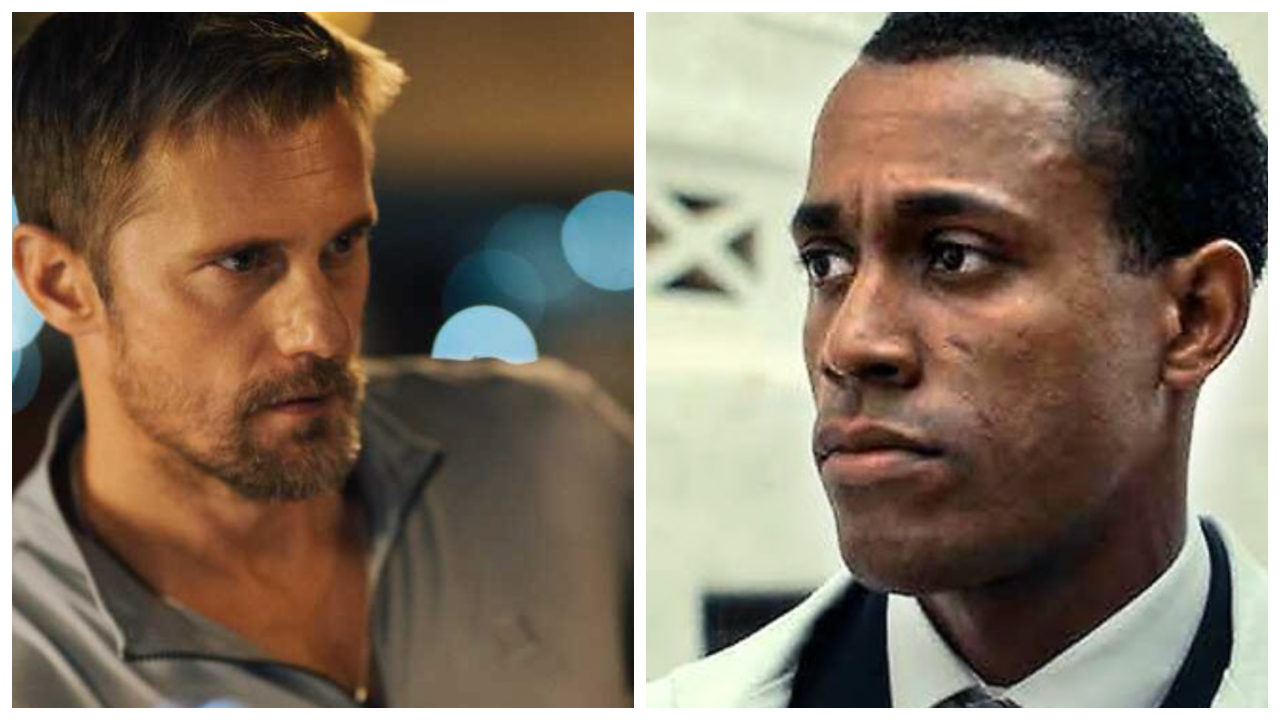Annie Hadel wants to know if I'm there for the initiation.
Well, I’m not, but now… uh, tell me more, Annie.
“Oh, I saw you come in and look around and I thought you might be one of the new members,” explains the sweet-faced woman in her early 70s.
(Note to aspiring journalists: A good way to get people to talk to you is to walk into the middle of a room and look confused.)
I tell her why I’d actually come to the Eagles Club in south Minneapolis this late Wednesday afternoon. After seeing countless bands in its event halls, hanging out a decent amount in the bar/lounge, and even throwing two birthday parties for myself there, I wanted to know more about this cozy holdover from the past, a spot where something not entirely expected always seems to be happening.
Hadel invites me to join her friends at the table, who were all members of the “aerie,” as the Eagles call their club, after the poetic term for an eagle’s nest. Its members are scattered all over the metro area. While Sue lives nearby, another friend of theirs drives in from New Brighton. No, they don’t all see each other as much as they used to, not like before Covid. Annie and her husband Mike, who live in St. Paul, joined back in 1973, around the time they got married, but John? He’s been a member since 1960.
All very interesting, I think to myself, but… initiations? I recall an old Minneapolis Tribune story I’d browsed that mentioned how one initiant of St. Paul’s Aerie #33 “was jolted in some electric shoes and went hysterical and needed a doctor’s care.” Anything like that on the docket for tonight?
Feeling welcomed and certain that I’ve softened up my source, I casually ask Annie if there’s any chance I could peek into the initiation, just for a couple of minutes.
Her warm and inviting face turns serious and impassive: “Absolutely not.”
So no, this story won’t divulge all the secrets of Aerie #34, or tell you everything about the Fraternal Order of Eagles, a national organization with over 650,000 members, founded over a century old, to which this club belongs.
But if you’ve ever line-danced in the ballroom, or got drunk at the bar, or watched your roommate’s new band stumble through its first gig there, or even if you've just driven past the sprawling, squat brown building tucked away in Seward, along with its enticingly massive parking lot, and wondered what was going on inside, here’s a closer look at the Eagles and the people who run it.
I’m back again for a typical Sunday evening at the Eagles, and in the Ernie Mattson Ballroom Mike McGee is teaching a few dozen line dancers what’s called a “wizard step”—“it’s one-two-AND rather than one-AND-two,” he explains, as in “We’re off to see the wizard.” “Don’t worry, I won’t sing it for you,” he adds.
Passing the ballroom on her way outside to smoke, a bar patron peers in through the doorway and gives some of the moves a shot, then shakes her head. “I be trippin' all over,” she laughs. A pigtailed little girl behind her lingers a bit, though, and seems to have better luck.
An older woman, slightly more put-together than the regulars gathered at the bar, orders a glass of red wine. She passes tables where families are eating dinner (plenty of room here for rambunctious kids) and the ever-busy pulltab booth to return to Shadewald Hall, where the trio Rogue Tango plays quietly but intensely and several couples dance very, very close.
If you’ve been to the Eagles Club, and you’re not a member, there’s a good chance it was to attend events like these. The clubhouse has three rooms—capacities of 200, 150, and 49—and if you count karaoke, there’s live music in the club every night. The Eagles started booking bands in 2003, and within three years the Strib was referring to it as “that unlikely south Minneapolis hotspot.” The man behind this change was then-trustee Dan Witt.
“He saved that place from bankruptcy—they were within three months of being closed,” Dan Turnlund tells me. “He did the work and got our gambling license back, and he also started doing live music. He built three PAs by himself and he used to mix all of the shows.”
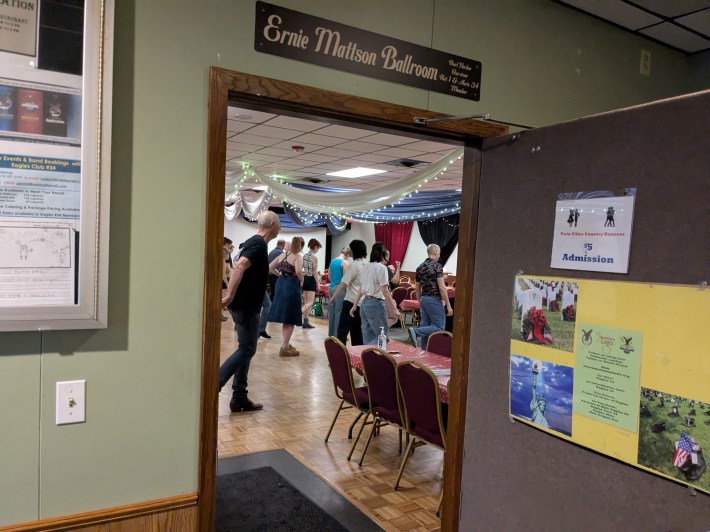
Turnlund, a chatty guy in his early 60s who helped run defunct Minneapolis bar/venue Lee’s Liquor Lounge for 15 years, has been in charge of booking, sound, doors, etc. at the Eagles since 2017. Before that, he worked under First Ave general manager Steve McClellan in the old days, but running a rock club isn’t his only area of expertise. “For a while I was kind of a lay pundit in the field of high energy particle physics and its nexus with cosmology,” he says.
What Turnlund learned from McClellan, he says, is that “the secret to being a successful venue is diversity.” And he doesn’t just mean that the Eagles offers a more inclusive environment than the wood paneling, replicas of bald eagles, and American flags would suggest—check the schedule and you’ll see notices of “LGBTQ+ Twin Cities Latin Dance” and “TwinCities Queer Contra Dancing.” He’s talking about a range of styles too.
Once a month at Tiny Tuesdays, local art-rock vets Tim Piotrowski and Patrick Larkin bring musicians in to do freeform 10-minute acoustic sets. Mechanix is a monthly EDM party, and I’ve already mentioned the tango and the country events. And then there’s rock. Just this past weekend, Annie Sparrows, formerly of local pop-punks the Soviettes, played with her new band, Panel. In 2016, I saw Mannequin Pussy, now opening for Turnstile in venues the size of the Armory, in the tiny Buechner Room, an occurrence so unlikely I’m glad UnderCurrentMPLS documented that it wasn’t a hallucination on my part.
“My vision is to have a place where bands can get their foot in the door and work with professionals who do it for a living, and they can learn some etiquette about how you show up, how you soundcheck, things like that,” Turnlund says. His idea of the Eagles as an entry-level slot extends to folks on the tech side as well—the Eagles recently established a paid internship for MCTC students who may know their gear but lack real-world experience.
“Our staff is one of the best in town,” he boasts, touting the fact that two of the Eagles’ sound engineers are women, still more of a rarity in the line of work than it should be. Hannah Lanier also has a sound job at U.S. Bank Stadium, while Sara Liebl is a former door person who learned sound on the job.
If anything the staff may be too dedicated. During a recent show, someone grabbed a wad of cash from the pull tab booth. Without hesitating, a new person working the door leapt up and tackled the thief, saving the night’s haul. Turnlund says, “I told her, ‘Kate, I’m really, really proud of you, but don’t ever do this again.’”
For much of this nation’s history, social clubs like the Fraternal Order of the Eagles were seen as emblems of American exceptionalism by European observers.
“Americans of all ages, all stations in life, and all types of disposition are forever forming associations,” the French student of U.S. mores Alexis de Tocqueville noted back in the 1830s in Democracy in America. It stood to reason that in a new nation, where so many of the traditional bonds of class or guild had been dissolved, people would gravitate toward one another in new ways, on their own terms.
Not all of the motives that brought these democratic citizens together were altogether noble—the Fraternal Order of Eagles, after all, was organized to break a strike.
In 1898, six Seattle theater owners beset by a musicians’ strike met in a shipyard. Together, they arrived at a solution to their labor woes: They hired piano players to replace the unruly musicians. They were so pleased with the fruits of their cooperation they formed a club that would become the Fraternal Order of Eagles.
Individual clubs were spread throughout the country by actors and other theater folk, always an itinerant lot. (There are over 1,500 aeries today, with 30 in Minnesota.) It’s a pedigree that’s allowed the Eagles to cultivate a slightly bohemian edge in contrast to the stolid Lions or Elks. The Eagles bylaws still state that there has to be a stage in each aerie where someone can perform.
The Eagles spread quickly: Only a year after the founding, a group of Twin Cities businessmen formed an aerie hereabouts, the 34th of its kind, located in downtown Minneapolis. Eagles #34 relocated to its current space in 1968, and the aerie’s current president, Mike McGee—yes the fellow who was teaching line-dancing—tells me happily they paid off the mortgage at 2507 E. 25th St. just a few years ago.
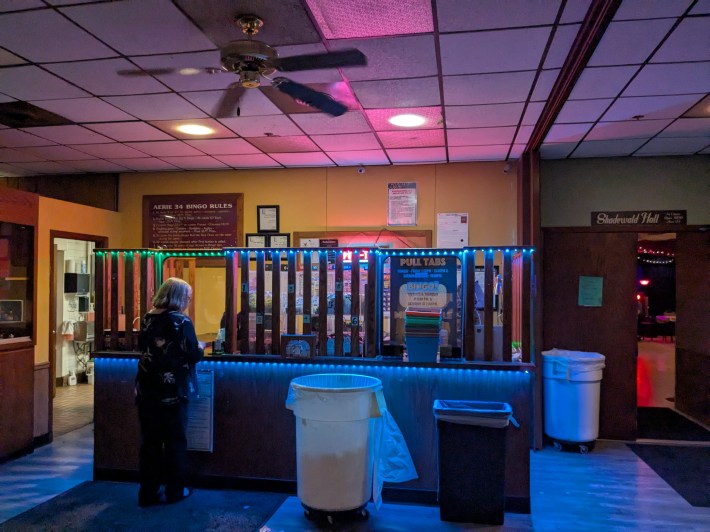
“We’re a small-town club in the big city,” is how Mike Hadel describes the Eagles today. Hadel’s the current secretary of Aerie 34 and the president of the state chapter, and he’s most proud of the Eagles’ charitable triumphs—not just the regular donations the club makes, but special projects like ponying up $3,500 to get new wrestling uniforms for nearby South High.
The club’s financial security, and its ability to give back to the community, rests on charitable gambling. The Aerie runs pulltab booths in several area businesses, and has installed pulltab vending machines in even more.
Hadel and his family have been part of the Eagles for four generations now—his 21-year-old granddaughter is the newest member. “She handles all that social media stuff,” he says.
Oh yes… women. These were called fraternal organizations for a reason. As Annie Hadel, the kind woman who thought I looked lost, points out, “At first it was a place for men to get away from home. But we didn’t like that we were what they were getting away from! So we changed all that.” (And yes, Mike is Annie’s husband.) Women’s auxiliaries were established in the 1950s—a "new era for the women of Eagledom," the organization trumpeted—but now the gender lines, though they’re still on the books, are largely vestigial.
The Eagles made their mark on politics as well over the years. National Eagles prez Frank E. Hering pushed tirelessly for the creation of Mother's Day and for a form of “social insurance” that would become Social Security (while arguing against a public health care system). These groups had some muscle behind them because they had the numbers—at their peak, about 40% of adult men in the U.S. belonged to some fraternal organization or another.
Like most of us, the Eagles aren’t as young as they used to be. The golden age of American social clubs is long past. Somewhere along the line, Celebrations of Life become more common than initiations.
It could be that club life represented a stodgy past to younger generations who preferred unstructured fun, or that suburbanization robbed Americans of the impulse to associate that fascinated Tocqueville. Hell, maybe clubs lost their luster when men could no longer hide away from their wives. You could probably write a book on why clubs went into decline.
There are already plenty of books about the supposed results of that decline. Now a quarter-century old, Robert Putnam’s Bowling Alone blamed just about every social ill we suffered on the decline of American civic life. And a number of recent articles discussing the epidemic of male loneliness in America make a similar diagnosis. You don’t have to go that far to recognize the simple fact that there are very few organizations that exist today for the sole purpose of letting you make friends.
But the effects of that decline haven’t all been bad. For much of its existence, Aerie #34 was a private club, and if you look at the south entrances, you can see where members used to insert their keycards. Now clubs like the Eagles have to cast a wider net for members.
“We joke that the younger members keep the bar in business,” Annie Hadel says. She and the elders call them “kids,” with no disparagement intended.
One such “kid” is Dan Hornsby, 36. (Appearances to the contrary, men do not have to be named “Dan” or “Mike” to join the Eagles.)
“I’d been looking for a cool little dive for a while, with a community feel. I fell in love with it. Now I go there a couple times a week,” Hornsby says. “It’s kind of an all-you-can-eat buffet of humanity.”
A novelist and musician, Hornsby is a transplant from Tennessee who was looking for places to write when he moved to town. Now he’s not only a member, but he’s convinced other friends to join as well.
For Hornsby, the Eagles is a refuge from the homogeneity of his social life.
“There are people of all different kinds of backgrounds,” he says. “Some older people, some Somali guys, some Native folks, you have people who’ve been there for a really long time, you’ve got the younger punk scene. I like the mix.”
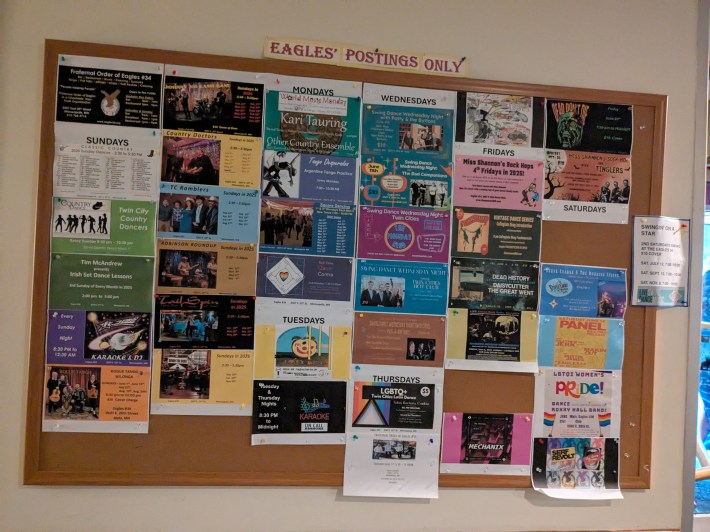
One reason the Eagles has become such a lively blend of people is that it’s been a place to turn when your old haunt disappears. When the West Bank’s Viking Bar closed in 2006 and veteran bluesman Willie Murphy lost his longtime residency, he migrated across Franklin Avenue to the Eagles. McGee, the president/dance instructor, came over after Lee’s closed north of downtown, and he’s one of many to make that jump, including longtime Lee’s fixture Miss Shannon, who regularly offers swing-dancing lessons at the Eagles.
This can make for an odd jumble of occupants at the club. Annie Hadel admits she’s a bit confused by the cultural practices of the younger generations. “The kids, they just stand there, they don’t dance,” she says of the punk and metal shows.
But Mike Hadel does remember one time that broke down. A member’s ’50s-style rock ‘n’ roll band was playing in the ballroom; a metal show was booked in the other room. “The heavy metal kids got curious,” he says. “The old-timers invited them in and taught them the dance steps. They were all dancing together.”
You can think of clubs like the Eagles as the old growth trees of civic life—if they fall, it’d take ages to create new community groups to replace them. Though sadly there were in fact no initiations scheduled on the night I visited, an average night at the club is enough to reassure you that Eagles #34 isn’t going anywhere—and is probably more interesting than any old initiation anyway.
